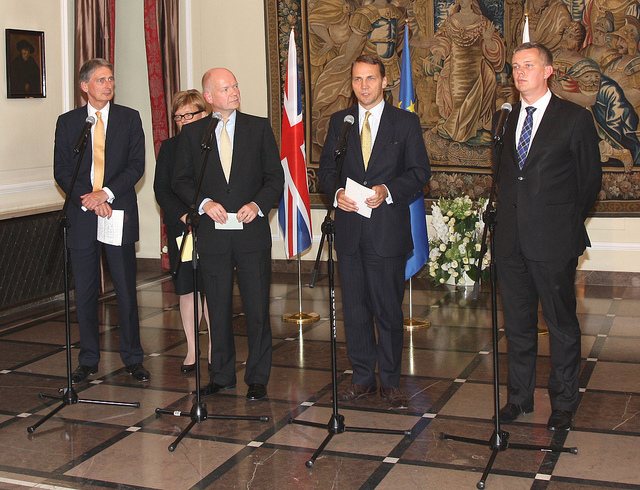 Europe is facing a number of complex and inter-connected challenges. Threats are diverse and emanate from many sources, making international security unpredictable. Despite signs of economic growth, many national defence budgets will remain under severe strain in the near future. At the same time, the US has signalled that it is looking to work more in partnership with European Allies.
Europe is facing a number of complex and inter-connected challenges. Threats are diverse and emanate from many sources, making international security unpredictable. Despite signs of economic growth, many national defence budgets will remain under severe strain in the near future. At the same time, the US has signalled that it is looking to work more in partnership with European Allies.
Poland and the United Kingdom agree that European nations must assume greater responsibility for their own security interests. European nations continue to lack many capabilities necessary for the full spectrum of NATO and EU missions. So if we are to shoulder fully our common security responsibilities, we must commit to building our defence capabilities and make them available to NATO and the EU’s Common Security and Defence Policy (CSDP).
In December, EU Heads of State and Government will meet to discuss defence issues, taking decisions that will set the course of CSDP in the years to come. The December European Council therefore provides a timely opportunity to address the EU’s defence capability. Poland and the UK believe that agreement on three concrete actions would help deliver progress on this. All are in line with existing collective commitments.
First, Member States should use the Council as a platform to articulate clearly to European audiences, the need to continue to invest in defence. Threats to European Security are diverse and in many cases unpredictable. Both CSDP and NATO remain central to Europe being both willing and able to confront these challenges wherever they arise.
Second, the Council should reiterate the importance of NATO and the EU playing a complementary and mutually reinforcing role in supporting international security. As active NATO and EU members, Poland and the UK believe both organisations should improve coordination and practical cooperation. It is also essential that European nations work together to tackle prioritised capability shortfalls to meet common EU and NATO requirements. Member States should therefore pledge to work more in partnership to deliver Europe’s capability needs, coordinating capability development and avoiding duplication. For example, by ensuring the EU’s Pooling and Sharing and NATO’s Smart Defence initiatives do not overlap or duplicate each other.
Third, Member States should commit to reinvigorate the EU Battlegroup concept – the EU’s rapid response force, agreeing specific measures enabling it to be deployed more flexibly as part of the EU’s comprehensive approach, tackling conflict through using a combination of civilian-military tools.
Poland and the UK are already making significant contributions to the development of defence capability in Europe. We remain two of Europe’s leading investors in defence. In addition, we continue to make our defence capabilities available to protect our common security interests. Our Armed Forces are deployed in Afghanistan and have recently deployed to Mali and we will continue to look for areas for cooperation and issues where we can assist each other to develop our defence and security capabilities, whether through mechanisms such as joint military Exercises, learning lessons from our experiences in Afghanistan or through collaboration on issues such as cyber security.
Poland and the UK are fully committed to using December’s European Council on defence and the planned NATO Summit in 2014 to ensure that European nations are collectively ready to assume more responsibility for protecting our common security interests.
Joint Statement by the Foreign and Defense Ministers of Poland and the United Kingdom.
Image: Quadrilateral consultations between Britain and Poland, Sept. 19, 2012 (photo: UK Foreign Office)
